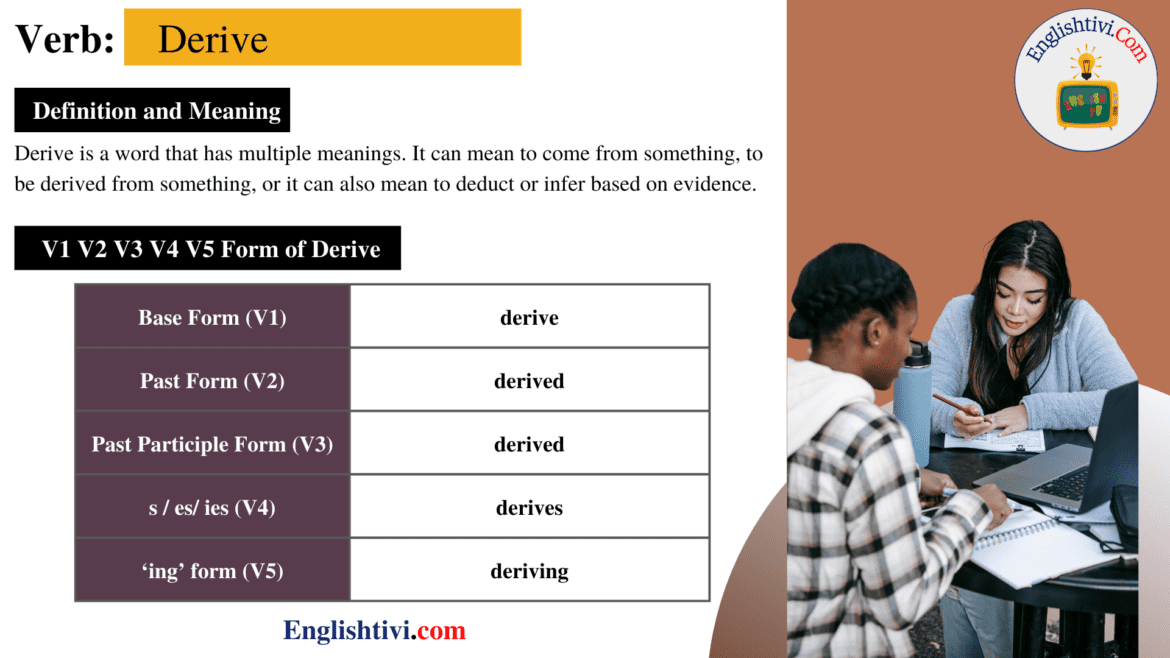Derive V1 V2 V3 V4 V5 is one of the verbs that are used very commonly in English tests as well as in everyday communication. Also, because it’s an irregular verb, derive doesn’t follow the regular rule. The verb “derive” has five different forms: base form, past simple, past participle form, present perfect, and present perfect participle. So what is derive‘s past? How do conjugate verbs with derive verbs?
⏩ Sign Up to Get Bonus
Let’s find out with English tivi in the article below.
See more at: Verbs
Derive of Definition and Meaning
Derive is a word that has multiple meanings. It can mean to come from something, to be derived from something, or it can also mean to deduct or infer based on evidence.
V1 V2 V3 V4 V5 Form of Derive
| Base Form (V1) | derive |
| Past Form (V2) | derived |
| Past Participle Form (V3) | derived |
| s / es/ es (V4) | derives |
| ‘ing’ form (V5) | deriving |
Derive of Past Simple V2
The verb Derive is also employed in its V2 form as “derived”’. It is used to indicate the past tense in sentences.
Derive of Past Participle V3
The V3 form is identical to the V2 form. The V3 form is “derived”. Derived is used in the past or present perfect tense.
+ In the present perfect tense, we use the word V1 as ‘have + derived‘ or ‘has + derived'.
- I, you, and we are used as ‘have + derived‘.
- ‘has + derived' is used for he, she, and it.
+ If you need to use the past perfect tense, use ‘had + derived‘ regardless of the subject.
You might also like: ALL the English Grammar Basics You Need
Conjugation of Derive V1 V2 V3 V4 V5
Conjugation table: Derive | |||
| Number | Singular | ||
| Present Simple of derive | I | You | She/He/It |
| derive | derive | derives | |
| Plural | |||
| We | You | They | |
| derive | derive | derive | |
| Present Continuous of derive | I | You | She/He/It |
| am deriving | are deriving | is deriving | |
| Plural | |||
| We | You | They | |
| are deriving | are deriving | are deriving | |
| Present Perfect of derive | I | You | She/He/It |
| have derived | have derived | has derived | |
| Plural | |||
| We | You | They | |
| have derived | have derived | have derived | |
| Present Perfect Continuous of derive | I | You | She/He/It |
| have been deriving | have been deriving | has been deriving | |
| Plural | |||
| We | You | They | |
| have been deriving | have been deriving | have been deriving | |
| Past Simple of derive | I | You | She/He/It |
| derived | derived | derived | |
| Plural | |||
| We | You | They | |
| derived | derived | derived | |
| Past Continuous of derive | I | You | She/He/It |
| was deriving | were deriving | was deriving | |
| Plural | |||
| We | You | They | |
| were deriving | were deriving | were deriving | |
| Past Perfect of derive | I | You | She/He/It |
| had derived | had derived | had derived | |
| Plural | |||
| We | You | They | |
| had derived | had derived | had derived | |
| Past Perfect Continuous of derive | I | You | She/He/It |
| had been deriving | had been deriving | had been deriving | |
| Plural | |||
| We | You | They | |
| had been deriving | had been deriving | had been deriving | |
| Future Simple of derive | I | You | She/He/It |
| will/shall derive | will/shall derive | will/shall derive | |
| Plural | |||
| We | You | They | |
| will/shall derive | will/shall derive | will/shall derive | |
| Future Continuous of derive | I | You | She/He/It |
| will/shall be deriving | will/shall be deriving | will/shall be deriving | |
| Plural | |||
| We | You | They | |
| will/shall be deriving | will/shall be deriving | will/shall be deriving | |
| Future Perfect of derive | I | You | She/He/It |
| will/shall have derived | will/shall have derived | will/shall have derived | |
| Plural | |||
| We | You | They | |
| will/shall have derived | will/shall have derived | will/shall have derived | |
| Future Perfect Continuous of derive | I | You | She/He/It |
| will/shall have been deriving | will/shall have been deriving | will/shall have been deriving | |
| Plural | |||
| We | You | They | |
| will/shall have been deriving | will/shall have been deriving | will/shall have been deriving | |
| Conditional Present of derive | I | You | She/He/It |
| would derive | would derive | would derive | |
| Plural | |||
| We | You | They | |
| would derive | would derive | would derive | |
| Conditional Perfect of derive | I | You | She/He/It |
| would have derived | would have derived | would have derived | |
| Plural | |||
| We | You | They | |
| would have derived | would have derived | would have derived | |
| Conditional Present Continuous of derive | I | You | She/He/It |
| would be deriving | would be deriving | would be deriving | |
| Plural | |||
| We | You | They | |
| would be deriving | would be deriving | would be deriving | |
| Conditional Perfect Continuous of derive | I | You | She/He/It |
| would have been deriving | would have been deriving | would have been deriving | |
| Plural | |||
| We | You | They | |
| would have been deriving | would have been deriving | would have been deriving | |
| Present Subjunctive of derive | I | You | She/He/It |
| derive | derive | derive | |
| Plural | |||
| We | You | They | |
| derive | derive | derive | |
| Past Subjunctive of derive | I | You | She/He/It |
| derived | derived | derived | |
| Plural | |||
| We | You | They | |
| derived | derived | derived | |
| Past Perfect Subjunctive of derive | I | You | She/He/It |
| had derived | had derived | had derived | |
| Plural | |||
| We | You | They | |
| had derived | had derived | had derived | |
| Imperative of derive | I | You | She/He/It |
| derive | |||
| Plural | |||
| We | You | They | |
| Let’s derive | derive | ||
See more at: Vocabulary
Example Sentences with Derive V1 V2 V3 V4 V5
In this section, we will learn about derive sentence examples:
- The gut muscle and most vascular muscles are derived from the mesoderm in most bilaterians.
- The beauty of this speech derives from paying attention to the Anacoenosis, which begins at the twelfth line.
- The federal estate tax refund for state death taxes has derived significant money for states, including California.
Synonym Words For Derive
Synonym of derive word list. Here are a variety of words whose meaning is nearly the synonym of derive:
- arise
- issue
- spring
- stem
- emanate
- proceed
- originate
- flow
- deduce
- infer
- gather
- reason
- determine
- draw
- conclude
- understand
- judge
Opposite Words For Derive
The antonym of derive word list. Here are some words that have nearly the opposite meaning as derive:
- give rise to
- cause
- occasion
- engender
- produce
- effect
- generate
- doubt
- misunderstand
- disbelieve
- scatter
- disperse
- divide
- distribute
You might also like: Best List of Irregular Verbs in English
Some Frequently Asked Questions About Derive (Verb)
What is the V1 V2 V3 V4 V5 of derive?
The past tense of derive is derived. The third-person singular simple present indicative form of derive is derives. The present participle of derive is deriving. The past participle of derive is derived.
| Base Form (V1) | derive |
| Past Form (V2) | derived |
| Past Participle Form (V3) | derived |
| s / es/ es (V4) | derives |
| ‘ing’ form (V5) | deriving |
What is the V2 and V3 form of derive?
+ The V2 and V3 form of derive is “derived“.
What is the sentence of derive?
What is the past tense V2 of derive?
+ The past tense of derive is “derived“.
What is the past participle V3 of derive?
+ The past participle of derive is “derived“.
What is the present participle V5 of derive?
+ The present participle of derive is “deriving“.
Conclusion
Let’s learn with English TV the structure of the verb “Derive V1 V2 V3 V4 V5“: Base Form, Past Simple, Present Continuous and Present Continuous and Present Continuous and Present Continuous forms. We wish you all the best of luck.
You should subscribe to the English TV YouTube channel if you want to learn more about the English language and improve your proficiency.





